Don’t Get Bold Feet!
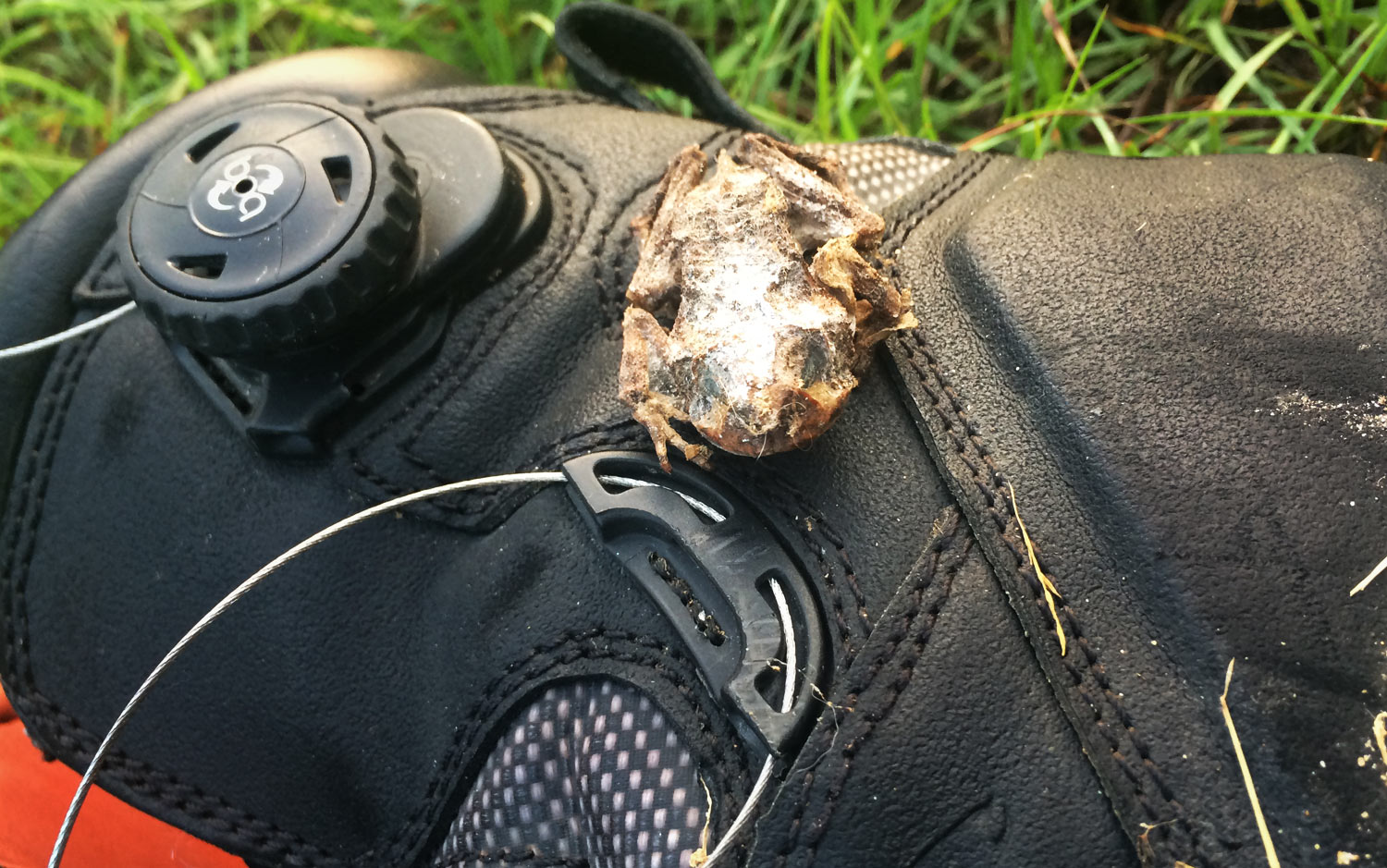
By Justin Pickett
A few weeks ago I was sitting on the back of my jeep, getting ready to hit the water.
Just like any other day, I grabbed my rods and rigged them up first and laid them across the roof. I tossed my fly boxes in my chest pack and made sure I had all the tools and tippet that I needed. I jumped into my waders and buckled myself in for the day. Grabbed my left wading boot and slipped it on and tightened it up. Reached down for the right one and began to slide my foot into the boot. Before I could get my foot settled into the boot I felt quite the bulge in the toe of my boot. Not knowing exactly what it was, and knowing what it could be, I quickly kicked the boot from my foot. My wading boot landed on the grass, just a few feet in front of me. I waited a few seconds to see if anything crawled, hopped, or slithered out from it.
Nothing.
Cautiously, I picked up the boot and held it upside down, and, immediately, something fell from the boot
Read More »7 Easy Steps To Successful Saltwater Fly-Fishing: Video Round-up
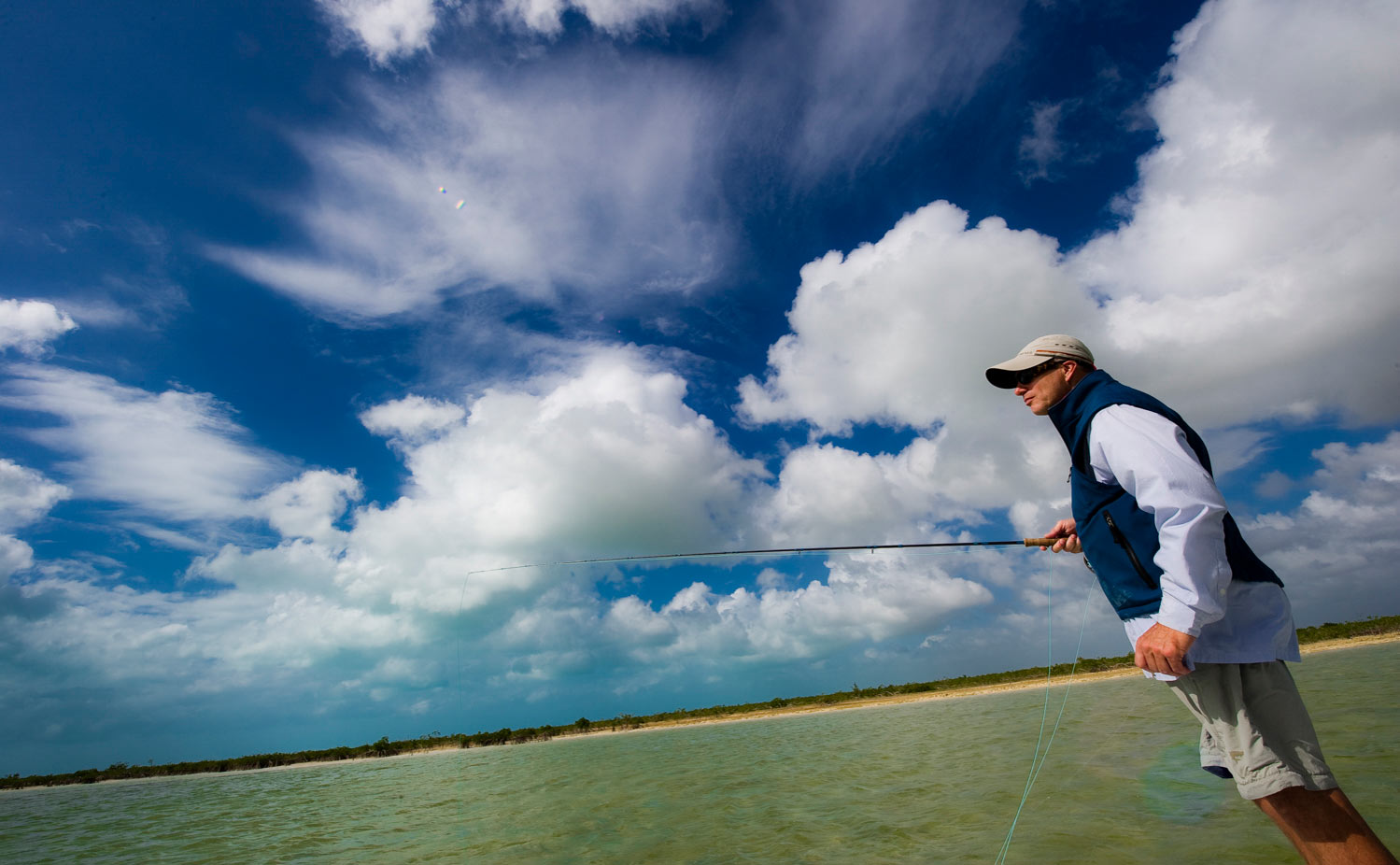
Let’s review some basic skills you need to get started catching fish on the fly in saltwater.
Success in saltwater fly fishing is all about the fundamentals. If you understand and practice the fundamental skills you will catch fish. There is a lifetime of learning but once you have the basic skills it’s a blast learning the rest.
Saltwater fly fishing doesn’t have to be daunting. Any angler can learn and today we’re going to review the skills you need for some great days on the water. Skills simple enough for any angler to understand and put into practice.
7 VIDEOS TO HELP YOU CATCH FISH ON THE FLY IN SALTWATER
Let’s start with the most basic and likely most important aspect of saltwater fly fishing, communicating with your guide. Understanding the
Read More »Handling Trout in Cold Weather
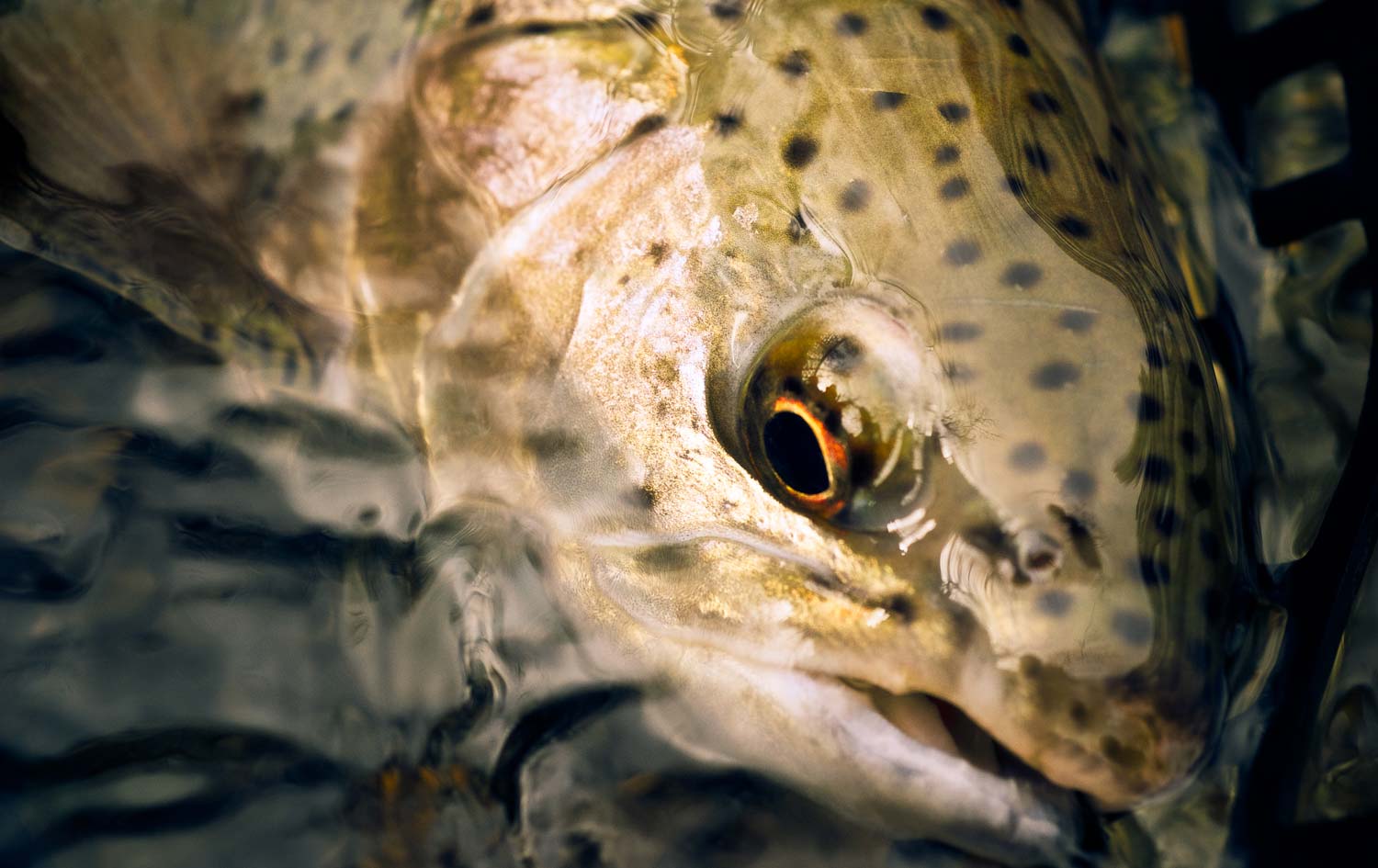
Handling trout in cold weather requires special care.
When temperatures drop below freezing good catch-and-release practices become critical. We think of trout as needing special handling care when water temperatures are high, but fish are just as vulnerable when air temperatures are low. Mishandling fish in cold weather can easily be fatal.
Fish are, of course, cold blooded. They’re bodies do not produce heat like ours do and this leaves them especially vulnerable to frostbite. The fragile tissues of their gils can freeze in an instant when air temps are below freezing. Again, they have no body temperature to stabilize their cells, so it happens quickly.
We adapt very well to cold temperatures. We have evolved to survive wide temperature swings. Fish on the other hand have evolved in a world which never drops below freezing, so taking them out in the cold air is as alien to them as dropping us on the surface of Mars.
The solution is simple.
Read More »Stealth For Trout- Stand Still
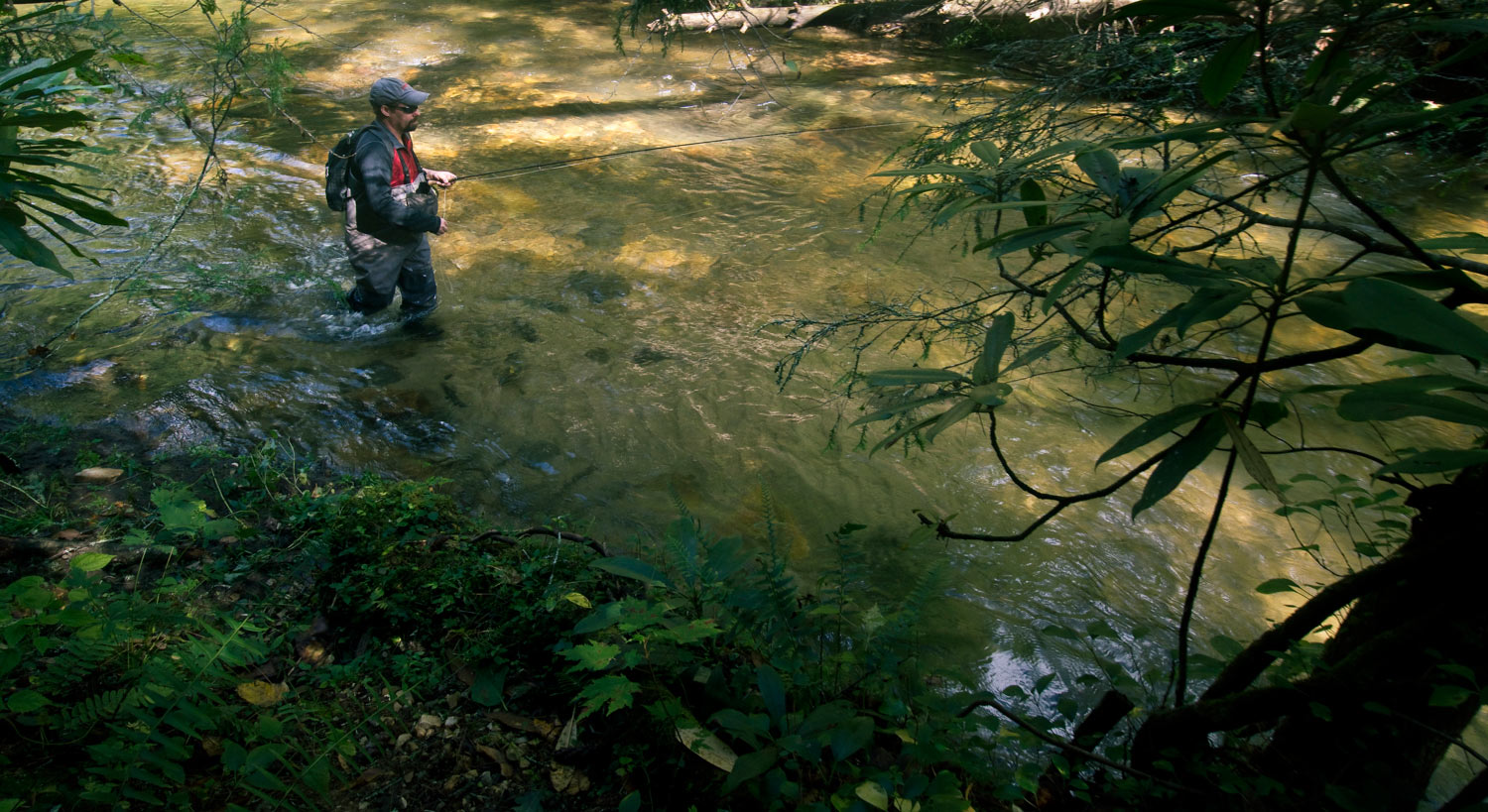
By Jason Tucker
I used to spinner fish for trout a lot.
Much of it was done as a scouting tool in preparation to come back and fly fish, and at times I even clipped the hook off and simply took note where the fish were. It was a great scouting tool, one I have long since abandoned.
In several years of this kind of fishing I began to notice a trend. In my haste to cover water, I often kept wading as I cast. At times I was puzzled as to why a particularly good spot did not yield a fish. I would stop and cast some more, and very often come up with a fish.
Over time a pattern emerged. If I was in motion, I came up blank; if I stopped moving, a fish would strike. I even began to experiment and count the fish I caught while moving and standing still. There was no comparison. Oftentimes fish would follow and not strike if I was in motion, and then strike once I stood still.
I later tested this while fly fishing, using a skunk pattern. I often fish up a stretch of river with dries, and then fish skunks back downstream. Skunks work best with a down and across presentation. Again the pattern emerged– if I was in motion I caught nada, if I stood still, even in a pool I had already disturbed, then I at least had a chance at fish.
Sound moves faster and more efficiently through water than air–it’s science.
We as angler’s also tend to
Read More »Strike Indicators, What Matters to Me
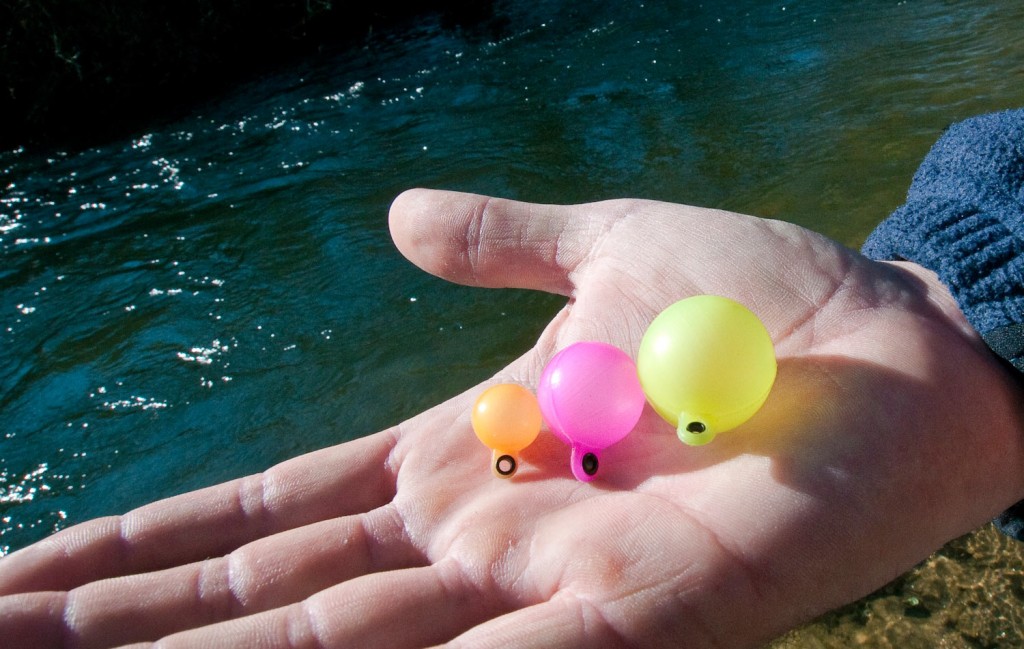
Do Strike Indicators spook fish?
There is a lot of debate over whether strike indicators spook fish. I’m not going to beat around the bush on this one folks. I truly believe that most of the time they don’t. Especially if you rule out calm and slow moving shallow water. Only when I’m dealing with really spooky fish, do I downsize and dull down the color of my strike indicators. The other 80% of the time I think the fish pretty much just find them interesting, possibly a tasty morsel, or just another piece of trash floating over their heads.
What I really think we should be doing is looking at the other side of the coin. In my opinion, we should worry less about spooking fish with our indicators, and worry more about matching the correct size strike indicator to the type of water and rig we’re fishing. That makes much more sense to me, anyway. Now I know there’s lots of you probably saying this is obvious rookie stuff, Kent. I hear you all loud and clear, but bare with me a minute, because I still find myself having to explain to anglers why it’s a good idea to carry different sizes and colors of strike indicators on the water. And as long as I’m doing that, there’s a need for this information to be out there for people to read.
HERE’S HOW I GO ABOUT CHOOSING WHAT STRIKE INDICATORS I USE ON THE WATER.
Read More »Cicada Fly Patterns – 4 Gink & Gasoline Favorites

I get asked the question all of the time what’s my favorite place to fly fish?
Some may find it weird but I always have a hard time answering that question. I’ve had the opportunity to fly fish so many unique and beautiful places in my life that there’s no way I could settle on one place as my sole favorite. If you’re wanting a quick answer, a much better question to ask me would what’s my favorite hatch to fly fish. I’d have no problem giving you a straight answer on this question. If I could spend all my time traveling around and planning out my fly fishing for one specific hatch it would be with 100% certainty, the periodic cicada hatches that occur along the Eastern United States.
In 2000, I got to experience fly fishing the periodic cicada hatch for the first time in my life. The hatch happened to occur around my home waters and for one and a half months straight, I got to experience the heavenliness of strictly fishing giant foam cicada patterns on the surface. I’d never seen a hatch have so much effect on my resident fish and I’d never witnessed such epic dry fly fishing. Day after day, I landed multiple trophy trout. The amount of food that a periodic cicada hatch provides an ecosystem is insane. Some scholars claim that the food value of a periodic cicada hatch is equivalent to an Alaskan salmon run. Have no doubts, the cicada has the power to convince the smartest and biggest fish to drop their guard and come out and feed for several weeks with total recklessness 24 hours a day.
You don’t have to be an expert fly fisherman to find success fishing a cicada hatch. It’s probably the least technical hatch I’ve ever fished. All you need to do is get yourself a good cicada fly pattern and fish it on waters where the hatch is occurring. The only thing you really need to know is go big with your tippet (2X-3X) and don’t be too quick on your hook sets. Below are some of my favorite cicada patterns.
Read More »Fear And Loathing On The Water
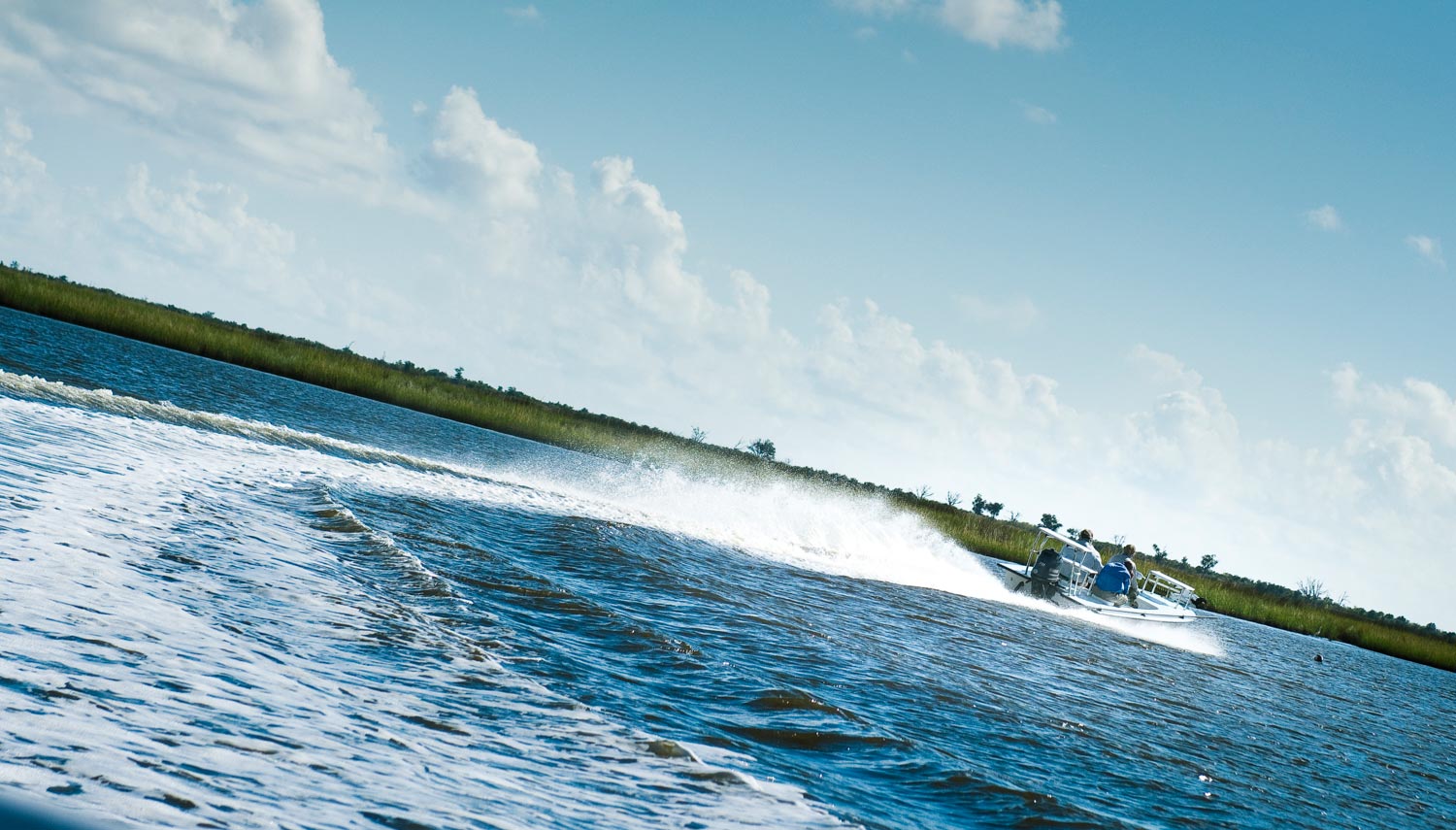
WHEN THINGS GO BADLY, YOU’VE GOT TO STAY POSITIVE AND TURN YOUR TRIP AROUND.
The sky is clear. Mangrove leaves glow in early morning sun. Dirty brown water floods the mud flats of Delacroix, Louisiana. I take in the view from the poling platform while struggling to move the boat against a twenty MPH wind. The last few days have been challenging, to say the least. We’ve battled the thunderstorms and wind, poor light and water clarity, and today the water temperature has dropped ten degrees. We were chased out of Venice when the Mississippi rose nine feet and landed here, where at least we know a couple of spots. The whole trip has been a mess and I’ve spent most of it on the platform. On the morning of this, the third day, I have only landed one redfish and I’m looking to turn things around.
I pole the boat into a sweet looking spot where the lee of a small island meets the mouth of a creek. It looks too good to not hold fish. My buddies Scott and Daren have given up on their fly rods and gone over to the dark side, throwing spoons and jigs on gear rods. Daren fires a cast into the creek and Scott casts to the island. Both lines come tight and we have a legitimate double in the first thirty minutes of fishing. My shoulders relax and I think that today things just might turn around. I spin the push pole in my hands and sink the point into the soft bottom to hold the boat while my friends land their fish. That’s when I hear a loud snap and the pole is suddenly free in my hand.
There’s no managing a flats boat in strong wind with a broken push pole. We spend most of day three riding back to the dock, driving a half hour to the nearest hardware store and fixing the pole. By afternoon, when we return to the flats, things have changed and there isn’t a redfish to be found. I blind cast wildly to fishy looking water while a pounding rises in my ears. My frustration becomes palpable and my casting sloppy. We call the day around 3:30 when the boats wiring starts acting up. I ride back to the dock in a state of self loathing. Voices of negativity singing choruses in my head. Feeling sorry for myself like a little bitch.
Just a week earlier I was swinging flies for steelhead on the Deschutes river in Oregon. Conditions were tough there too. I’d taken my friend Andy Bowen for his first west coast steelhead trip, to learn how to cast a two hander and swing flies from Jeff Hickman, who taught me. Andy was on the board early with two nice fish. His first, a wild buck, handed him his ass early in the fight, almost spooling him. The look on Andy’s face was priceless. He kept his cool and, with constant coaching from Jeff, landed the fish.
It was a perfect first steelhead experience. I always choose my words carefully when
Read More »Fly Fishing Q&A – What Would Kent Do
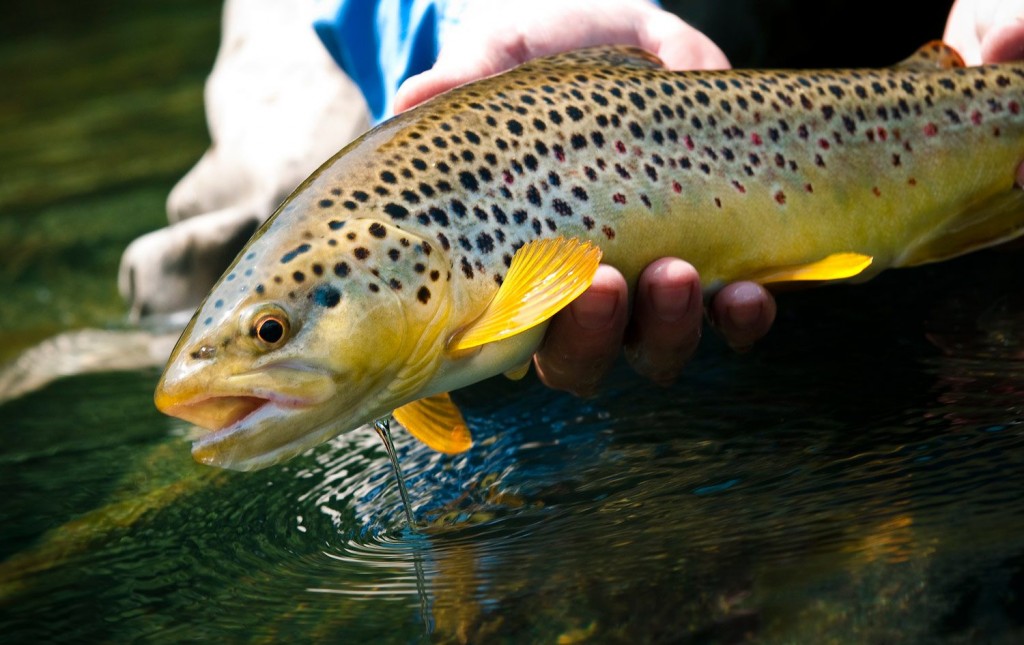
WE RECENTLY EXPERIMENTED WITH ASKING OUR G&G FACEBOOK FANS TO PROVIDE US WITH FLY FISHING TOPICS/QUESTIONS THEY WOULD LIKE US TO ANSWER AND GET MORE INFORMATION ON.
Louis coined the concept WWKD (What Would Kent Do) and it’s been very successful thanks to all of your participation. I picked out three inquiries from the participants and have provided my answers. Let us know how you like this Q&A platform and we’ll continue to use it in the effort to provide you with the content you desire.
Lance Lynch asks:
“You drive a hundred miles to a pristine river. You are so excited to get out and fish but you snap the tip off your rod. No spare rods, a full day ahead of you. WWKD?”
This is a great question because many of us have found ourselves in this situation before. You know how I always talk about carrying extra gear? This is why folks. Stuff like this happens all the time to us. It’s very easy to snap the tip off your rod getting it in or out of your vehicle, or even drop your fly reel on the ground and bend the spool. If you’re a serious fly fisherman, you should always take the time to pack extra gear, especially if you’re going to be traveling long distances to fish. Consider purchasing a inexpensive rod-tip repair kit and keep it in your vehicle and if you have a back up fly rod, pack it as well.
Fuji Rod-Tip Repair Kit
To answer your question, this is what I would do if I didn’t have a rod tip repair kit or a back up fly rod with me. It’s a quick fix, just carefully snip off the broken section as close as possible to your next rod guide with a pair of nippers or pliers. Keep in mind the fly rod won’t cast as nice, and it will catch the fly line some, but you’ll still be able to cast it well enough to make satisfactory presentations and land fish.
Kim Brock asks:
“What is the most important advice that you would give to a new trout angler. WWKD?”
This is a pretty broad question but here are seven tips I stress most with my novice clients.
One, take the time to learn the fundamentals of fly casting so you can learn proper technique. Always watch your backcast when your practicing fly casting and fishing on the water. It will shorten your learning curve, help keep you out of the trees and minimize tangles on the water. You’ll also improve your skill level much quicker overtime by doing this. If you don’t fish all that often, it can be very beneficial for you to practice fly casting a couple of times for 10-15 minutes in the yard before you head out on your fishing trip. Doing so, you’ll feel more comfortable and confident in your fly casting and you’ll have worked out many of your casting flaws.
Two, when you’re trout fishing don’t
Read More »The Perfect Gamefish
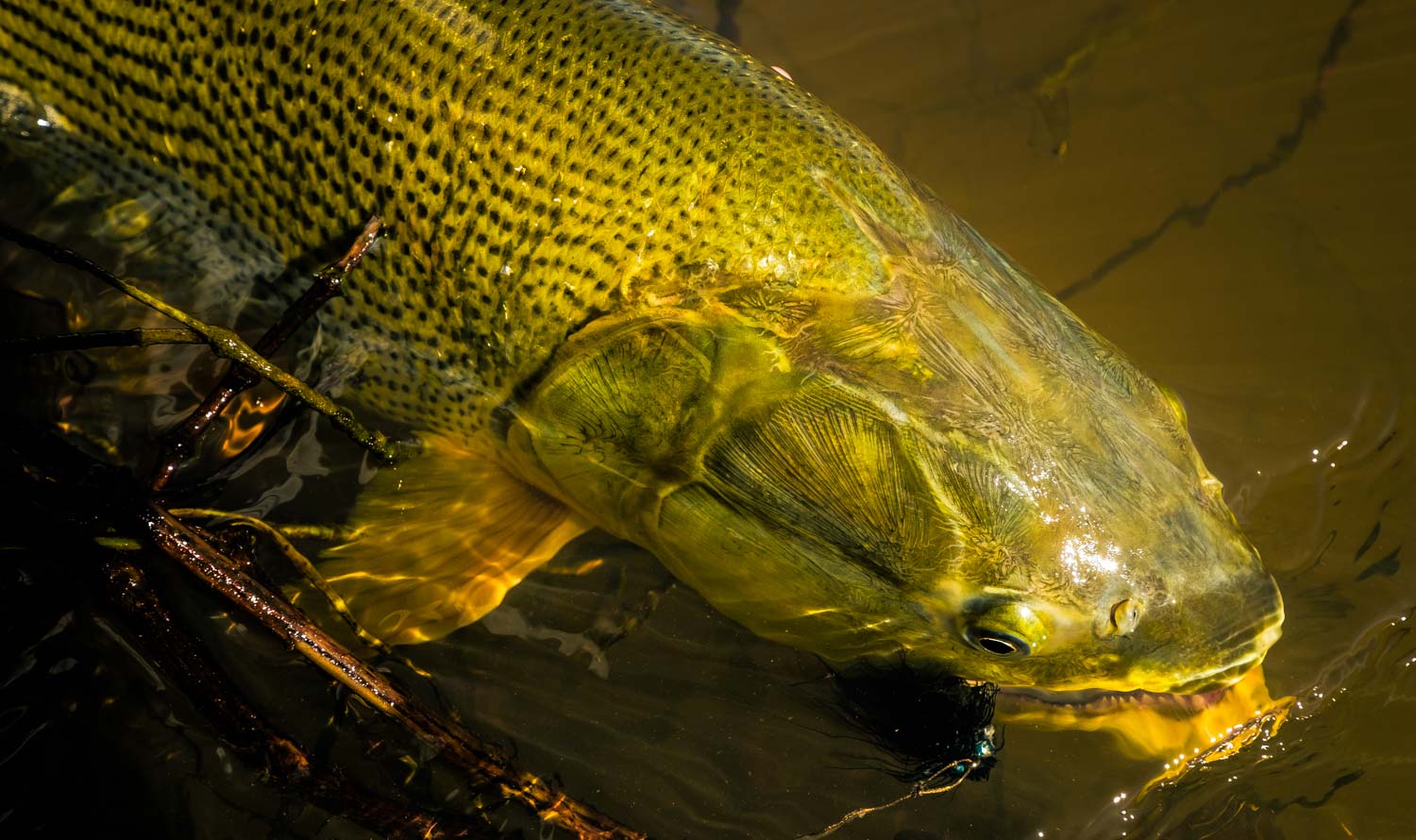
By Justin Pickett
All hype aside, golden dorado may be the perfect gamefish.
Prior to my trip to Parana On The Fly Lodge, I had my own preconceived ideas of what fishing for Golden Dorado might be like. Everyone knows they have teeth. You’ve no doubt seen them in photos, jumping and thrashing in the water. But what you don’t know about them, and what I didn’t know about them, will make them even more badass than you ever thought.
First off, they are some moody little bastards. Chucking hundreds, and sometimes thousands, of casts between fish is common. Not because the fish are scarce. There are plenty of fish living within the Parana’s waters. The Goldens just seem to have a particular set of requirements that must be met before they strike. Even the little guys can get picky and will inspect your fly all the way to the boat before turning away. I remember thinking to myself on the second day that this type of fishing reminded me of fishing for musky. Constantly pounding the banks and structure, over and over, fighting the urge to “zone out” from the repetitive nothingness of empty retrieves. Sometimes the only break in the monotony would be the occasional hang up in the bushes or trees, or maybe the hideous, haunting sound of howler monkeys blasting through the jungle. It took me a day and a half to land my first Golden Dorado. In other words, you have to work for them a little bit. You have to earn your stripes a little, and pay some dues. You’re not just going to step onto a boat, sling some line, and yank one in the boat. It takes a little bit of grit, and I like that.
Another thing that makes these apex river monsters awesome is where and how they hold in the river. Like many of our favorite gamefish here in the states, they are ambush predators. Hiding amongst submerged trees, bushes, rocks, sand banks, and cut-banks, the mean-muggers blend in to the powerful, turbulent waters of the Parana, despite their golden flanks. They hold on the
Read More »Flat Water Nymphing
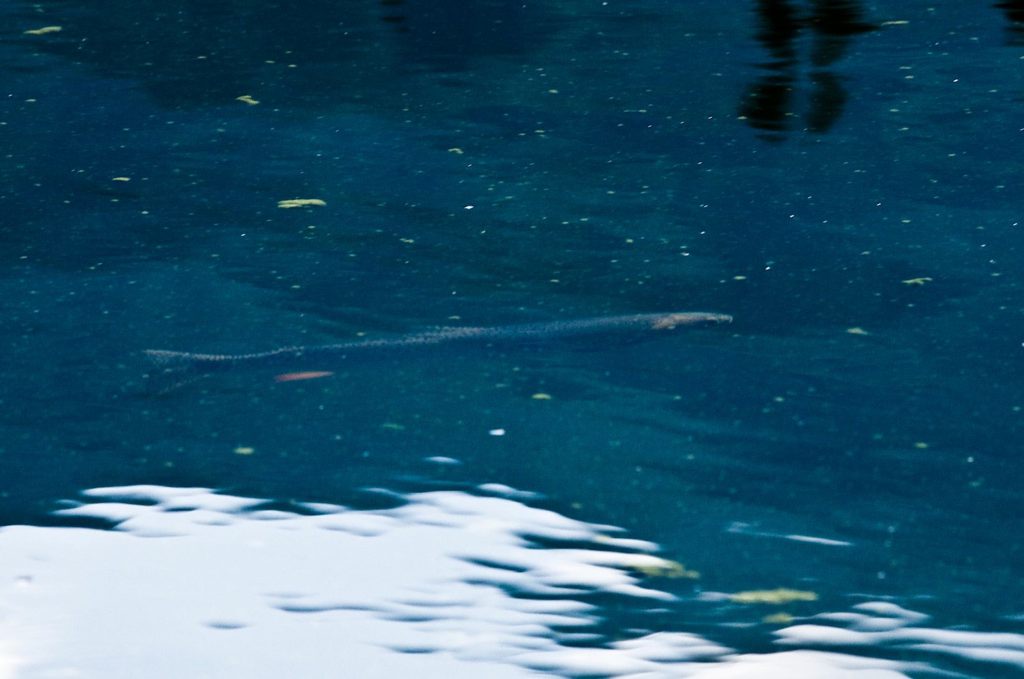
The past few years, Louis and I have grown very fond of one specific pool tucked up in mountains of the southern appalachia. We visit it regularly because of the bounties of trout that it sustains and nurtures year round. We nicknamed it the “lazy boy pool”, because it constantly has food entering the pool and its slow moving water and deep water cover requires little energy for fish to feed round the clock. It’s loved by lazy trout and they in turn grow big and fat. Despite the large numbers of trout the pool holds, angler won’t find it to be a cake walk for catching them. To have success in this pool you have to bring your A-game. The fish have grown wise to fly anglers and the glass calm and crystal clear water adds further to the overall challenge. Trout here, get to examine your flies for long periods and they regularly dish out more refusals than eats. It’s had Louis and I pulling our hair out on multiple occasions. If we need our ego’s checked, this is the perfect place for us to do that. It never fails to reminds us we are far from having it all figured out. The slightest mistake by an angler will send wakes across the water alerting all the trout in the pool, and when that happens, the fish get lock jaw.
Read More »